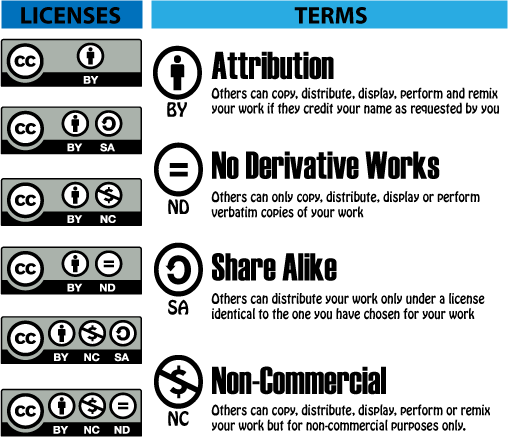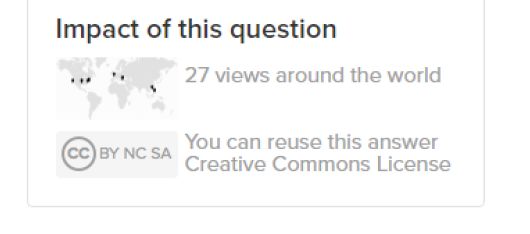Why must sources be credited so exactly? (Not just at Socratic, but in general.)
A learner here sent me this in a private message, but I'm interested in other's answers too.
A learner here sent me this in a private message, but I'm interested in other's answers too.
2 Answers
Because that's how Socratic's license works.
Explanation:
For starters, all third-party content added to Socratic must be attributed as stated in the terms of service, Content
You acknowledge and agree that, to the extent you incorporate any third party content into any User Content you add, create, upload, submit, distribute or post to the Services, you shall appropriately and accurately attribute, credit, and link to the original source of such User Content (the “Attributed Content”), and you shall indicate if you made any changes to the original source of such Attributed Content. You further acknowledge that you have the right to add, create, upload, submit, distribute, or post the Attributed Content to the Services.
Now, a lot of the content available online, especially educational content, is licensed under Creative Commons, CC. All Creative Commons licenses, regardless of their specific stipulations, require attribution, BY.

When the content is not licensed under CC, you cannot use it without express permission from the author.
As far as content copied from Socratic, Socratic uses a Creative Commons-Attribution-NonCommercial-ShareAlike license, which you'll find listed under the impact map on every question page.

This implies that content posted here can only be used with attribution, for non-commercial purposes, and using the same license.
Now, legal stuff aside, you should cite sources for third-party content in order to give credit to the original author(s). You are essentially using other people's work, so giving credit should be a must.
Moreover, citing an original source gives people the chance to follow up on the material you used to write your answer and it gives credibility to your work.
Some ideas on: credibility of source, use of source, assigning of credit, and the use of a consistent system of citation
Explanation:
I'm going to jump in on this question and focus on the "...so exactly" part of the question.
I'm going to use an example to help highlight my ideas, so let's say that I am writing a book called Watershed Fiascos and I'm going to cite some articles from different sources.
In my book, I cite an article from Science magazine (a very respected science magazine) and I also cite from Weird Weather magazine (which no one has ever heard of). By listing in my citations where I got each piece of evidence from, the reader can determine what is more credible and valid (i.e. the article from Science) and what is less so (i.e. the article from Weird Weather). A detailed citation helps the reader determine credibility of source.
What other information might a reader want or need? The author of the cited material would be good to know - perhaps a noted authority wrote that article in Weird Weather and a controversial author wrote the piece in Science - and so knowing this will help determine the credibility of source.
Let's go one step further with this - the reader wants to know if the sources I've cited are relevant to the topic in the book - did I accurately portray the information cited? To do that in the easiest manner possible, I need to list the publication, the issue, when it was published, the publisher (perhaps the reader will need to contact the publisher to get the issue), and other information to help the reader check how I used my sources.
In all of the above, the idea is that the ideas I am presenting in my book are built upon the ideas of others - if those ideas are faulty, then my work will probably be too. If the ideas are solid, then my work has a better chance of withstanding scrutiny.
Further, since my ideas are built upon the work of others, it's important to properly credit the people and organizations where the foundations of my work comes from .
In order to better help do all of the above, I need a consistent system of citing my sources so that it's as easy as possible for a reader to find the source material (and, in fact, will also help the authors of that source material link their work to mine and better enable them to comment, if needed, on my work).
Keep in mind that the rules underlying how sources are cited predate the internet age and so presumes that information isn't readily available via your favourite search engine! And so the providing of what, on the face of things now, might be extraneous information could actually be (or have been) vital to a reader.
I'm sure there are more reasons that underlie the rules behind the citation of sources, but I hope these few ideas help make sense of the hows and whys of citation of sources.


